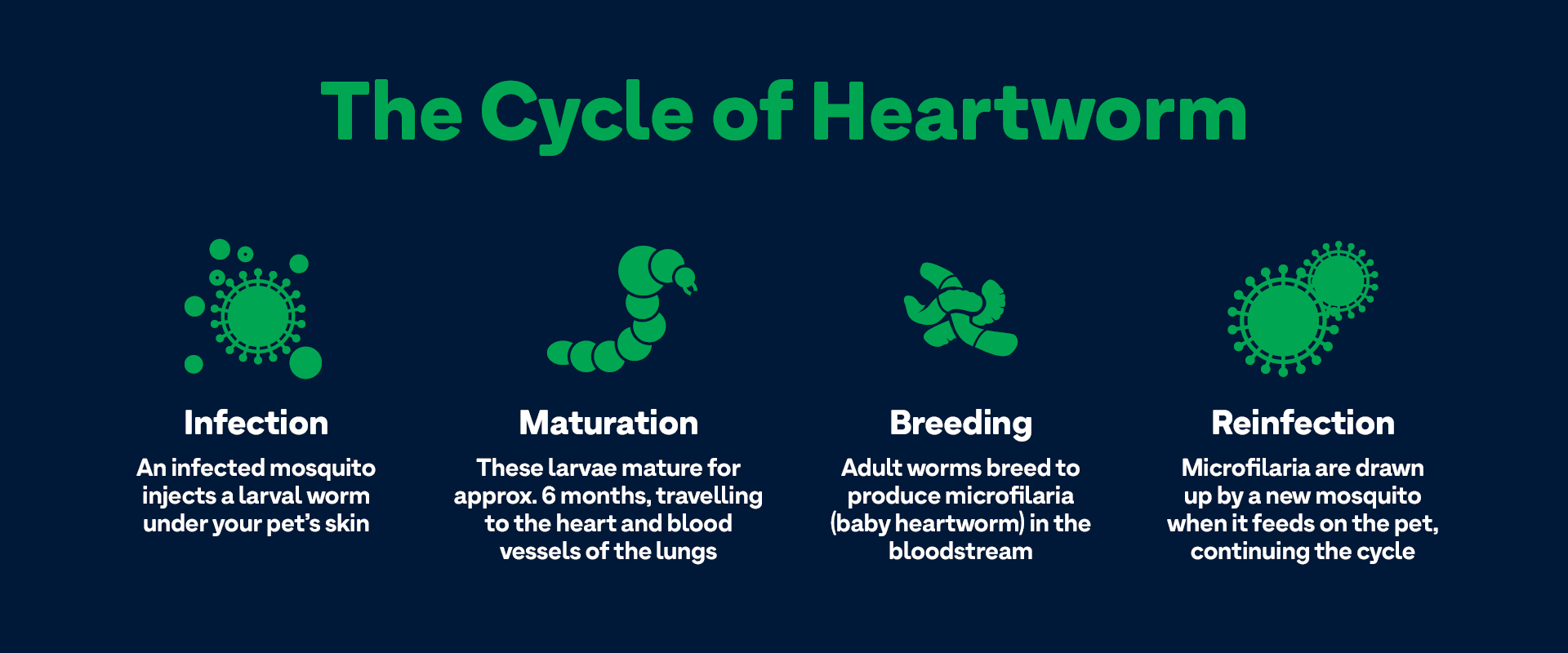Heartworm disease is responsible for infecting thousands of dogs and cats every year. This disease is potentially fatal yet completely preventable. Heartworm affects both dogs and cats; however, dogs have an increased risk of developing this disease, especially those that live outdoors.
What causes heartworm disease?
Heartworm disease is caused by a blood parasite that is spread by mosquitoes. Heartworms migrate through the tissue until they enter the vascular system. Once infected, these nasty parasites reside and live on the right side of the lungs and pulmonary arteries where they obstruct the flow of blood to the heart affecting the rest of the body. By the time heartworms reach the lungs, they are mature and can grow as long as 14 inches. Hundreds could be living at one time.
How common is heartworm?
The prevalence of heartworm in Australia remains poorly understood. What we know is wherever there are mosquitoes, there is potential for heartworm. There are ongoing studies to help experts learn more about heartworm infection in pets, which will assist in treating and preventing the disease. With the information currently available, it has been concluded that prevention is the best form of heartworm control.
Adult heartworm
Heartworms live in the right-hand side of the heart and the blood vessels going to the lungs. They cause damage to the lining of these blood vessels and cause the formation of small blood clots in the blood vessels deeper in the lungs. They can also cause inflammation in the delicate lung tissue around the airways in the lungs. In the early stages, there may be no obvious clinical signs. With time, the damage worsens.
Signs of heartworm disease in dogs include:
- Coughing
- Unwillingness to exercise
- Shortness of breath
- Weight loss
- Fever
- Abdominal swelling.
These symptoms are often subtle and hard to detect, so prevention is the best option. Treatment for heartworm disease is not without potential risk, may be difficult, and if left untreated, it is nearly always fatal.
Signs of heartworm disease in cats include:
- Vomiting
- Lethargy
- Breathing difficulty
- Weight loss
- Convulsions.
Usually, there are few clinical signs of heartworm in cats. Your cat could develop slight lethargy or a cough, but sudden death is more common if your cat’s heartworm has gone undetected and untreated. It only takes one to two adult heartworms infecting your furry feline for the disease to potentially become fatal.
In severe cases, the heart, liver and kidney will start to lose functional capacity, causing serious health problems.
Microfilaria
Microfilaria are immature or ‘baby’ heartworms produced by adult worms in the heart. They live in the bloodstream and can be transferred from animal to animal through mosquito bites.

How is heartworm disease diagnosed?
Proper diagnosis is essential to determine whether your pet’s health is good enough to receive treatment. This may involve a urine test, blood test, and chest X-rays
Can heartworm be treated?
Yes. However, prevention is far better than treatment. Since diagnosing heartworm can be challenging, especially in cats, your pet’s illness may be quite advanced and challenging to treat. Allergic reactions to heartworm treatments have been identified, and some treatments can have serious side effects, so staying on the safe side and keeping your pet up to date with their heartworm prevention is strongly recommended.
The basic treatment schedule
Heartworm has three treatment phases.
- The first phase – the pre-treatment phase – may not be required in all cases. This involves using medication at home to try and reduce some of the effects of heartworm infection, such as blood clot formation and roughening of the blood vessel lining. It can involve two to three weeks of oral medication.
- The second phase – adulticide treatment – involves the injection of a drug to kill the adult heartworm. Immiticide is the only drug currently available for heartworm therapy. It is administered by two injections 24 hours apart, or in some cases, treatment may be split. The split treatment is where a single initial injection is given. After one month of rest at home, your dog returns to have the full two-injection course.
- The third phase – microfilarial treatment – involves a day stay in the hospital to kill the baby heartworm.
A post-adulticide checkup is recommended one week after the administration of the adulticide drug. Two weeks after this, a final blood test is performed. If this test is negative, treatment is finished, and heartworm prevention is commenced.
Potential complications of treatment
There are several concerns with regard to treatment.
Once a drug has been administered to kill adult heartworm, the worms die over the next 5-14 days and are carried in the blood flow into the lungs. Each of the worms will block one of the many small blood vessels deep in the lungs. Because there are so many small blood vessels, blockage of a few may not cause outward signs of illness.
However, if a significant number of worms dislodge together and block more major blood vessels, this may damage a large portion of the lung and pose a serious problem. This event is called thromboembolism. The better your pet is confined and rested, the lower the risk of thromboembolism.
In severe cases, there is a risk of permanent damage to the heart and lungs requiring on-going medication. It is usually possible before treatment to predict which animals may be left with residual damage.
Immiticide has no liver or kidney toxicity. It is very effective against heartworm and will kill virtually 100% of worms. It can be used as:
a) Standard treatment – two injections 24 hours apart.
b) Split dose treatment – for dogs that are severely affected by heartworm or in an attempt to reduce the risk of thromboembolism.
In the split dose regime, the first injection kills 30-40% of the worms, and the remainder are killed when the two follow-up injections are given. This enables your dog’s body to cope with the dead worm load more gradually and thus reduces the risk of lung damage.
Prevention
Prevention is always better than cure, especially when it comes to heartworm disease. Heartworm is readily prevented through year-round heartworm-preventative medications. Heartworm prevention for dogs and cats should be started from six to eight weeks of age and continue for the rest of their lives. There are a variety of products available, such as:
- Tablets
- Chews
- Syrups
- Top spots
- Injections.
Heartworm prevention is now recommended for all cats, especially where there are mosquitoes. It can be challenging to diagnose heartworms in cats; hence, prevention is better than treatment.
Heartworm is a serious and often fatal condition. Prevention of heartworm is the best course of action. Contact your local Greencross Vets to discuss your pet’s heartworm prevention plan.


 Greencross Vets
Greencross Vets 










